Media Report Centrality of Party’s Darker ‘Base’
NABJ to Query Members on Capitalizing ”Black’
. . . Readers Have as Many Questions as Answers
Katrice Hardy Named Editor of Indy Star
Asian Americans See Ties to Coronavirus as Racist
. . . NABJ Not Expecting Virus to Stop July Convention
Earlier: Jury Finds Smiley Violated Morals Clause
Support Journal-isms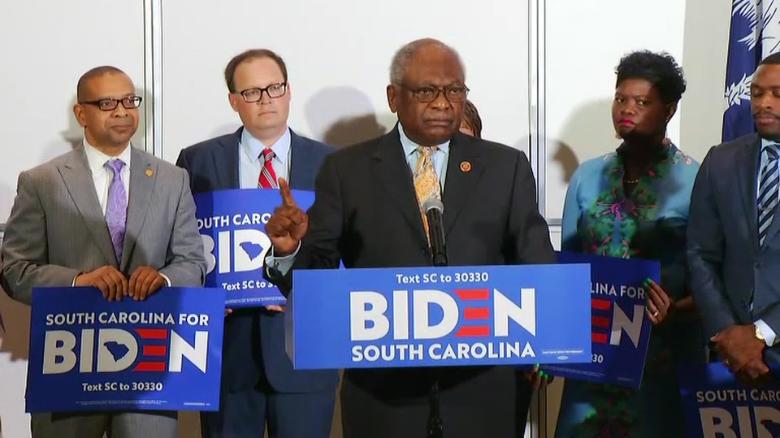
Media Report Centrality of Party’s Darker ‘Base’
If there is one thing the Democratic Party’s presidential primary campaign is demonstrating, it is that news media are recognizing the centrality of African Americans and Latinos to the prospects of the contenders. Blacks have been referred to as the “base” of the party, and failure to gain their support was cited for the truncated candidacies of Pete Buttigieg, Amy Klobuchar and Tom Steyer.
“The Democratic presidential race emerged from Super Tuesday with two clear front-runners as Joseph R. Biden Jr. won Texas, Virginia, North Carolina and at least six other states, largely through support from African-Americans and moderates, while Senator Bernie Sanders harnessed the backing of liberals and young voters to claim the biggest prize of the campaign, California, and several other primaries,“ Jonathan Martin and Alexander Burns reported for the New York Times.
Writing for NBC News, Sahil Kapur explained, “Biden’s dominant performance with black voters in South Carolina on Saturday was echoed in nearby North Carolina and Virginia on Super Tuesday, and fueled his victories across the South.
“So far, Sanders has barely, if at all, improved on his 2016 performance with African Americans in Southern states. But it remains to be seen if that will translate in other parts of the country. NBC News exit polls found that Biden won 62 percent of black voters in the South and 33 percent of black voters in other states. Most of the contests in the next two weeks occur outside the South.
“Biden has history on his side — the winner of black voters in each of the last five contested Democratic primaries has gone on to win the nomination. . . .”
In Washington D.C., a white police officer sexually assaults a black man on the street. “Stop fingering me bro,” the man says. HuffPost posted this video to illustrate a story Monday about stop-and-frisk with a warning: “Some viewers may find the . . . video to be graphic and triggering…” Repeated reminders of the stop-and-frisk policy in force while Michael Bloomberg was mayor of New York helped undermine Bloomberg’s support among people of color, despite recent apologies. (Credit: YouTube, 2017)
Michael Bloomberg, who suspended his campaign Wednesday, declared three weeks ago that he would spend $3.5 million with the black press, as Hazel Trice Edney and Hamil Harris reported for TriceEdneyWire.com.
Black voter preferences did not translate to all voters of color. As the voter tallies from the East piled up victories for Biden on Tuesday, television anchors repeatedly cautioned that Latino voters in California and Texas were expected to deliver for Sanders.
The caution proved prudent. In Texas for example, exit polls showed:
White (44%): Sanders 32% Biden 29%;
Latino (31%): Sanders 45% Biden 24%
Black (21%): Biden 60% Sanders 17%
Asian (2%): Sanders 57% Biden 13%
Still, Biden eked out a statewide victory. And both blacks and Latinos suffered from voter suppression efforts, leading to long lines, particularly near historically black Texas Southern University.
“The 50 counties that gained the most Black and Latinx residents between 2012 and 2018 closed 542 polling sites, compared to just 34 closures in the 50 counties that have gained the fewest black and Latinx residents,” according to a recent analysis in The Guardian, Ari Berman reported in Mother Jones.
Some commentators tried to explain the differing motivations among blacks and Latinos. Some made the additional distinction between older and younger members of the same ethnic group.
Sanders “avoided reflecting on his general lack of support among Black voters by touting his performance with “people of color” in an interview the day after he received few Black votes in 14 states’ primaries,” Sanjana Karanth reported Thursday for HuffPost .
After the Nevada caucuses, Tehama Lopez-Bunyasi and Stephen Nuño-Pérez of the Latino Decisions research organization wrote for NBC Think on Feb. 25, “Part of Bernie Sanders’ sweeping win among Latinos on Saturday — he took 33 percent of the Latino vote, according to our estimates — came because he understood the many ways that the system turns off Latinos, and that if Latinos instead have reason to think the system can work for them, they will show up on Election Day. As such, he never stopped building infrastructure within the Latino community after his first attempt at the presidency in 2016. . . .”
Last night’s results are a reminder to political reporters that in covering what “average Americans” think about the election, it’s not just Rust Belt diners. It’s also going to places like African American barbershops and suburban Whole Foods parking lots.
— Dan Rather (@DanRather) March 4, 2020
As might be expected, black turnout for Biden produced a backlash, as Renée Graham noted Wednesday in the Boston Globe.
“ ‘People won’t say it, but the truth is that many voters in SC are low information voters. Which is a nice way to put it,’ tweeted a self-described ‘Bernieorbust’ socialist,” Graham wrote. “That’s been the general racist theme since the primary, with Biden’s success dismissed as a result of ill-informed Black voters blindly drifting toward a familiar name.
“As usual, racism intentionally diminishes any understanding of the ways of Black folks.
“It’s important to reiterate that Black people are no more monolithic in voting than they are in any other area of their lives. To be sure, every Democratic candidate has Black supporters. Yet Biden has two advantages. The most obvious one is the eight years he served alongside President Barack Obama. Especially among older Black voters, his history and friendship with the nation’s first Black president resonates.
“And there is also this for Black voters: pragmatism.
“That’s what I heard while I was in South Carolina for the primary. . . .”
- Jon Allsop, Columbia Journalism Review: The media primary
- Emily Badger, New York Times: The Lasting Effects of Stop-and-Frisk in Bloomberg’s New York
- Benjamin Barber, Facing South: As young voter participation has grown, so have Southern states’ efforts to curb it
- Rekha Basu, Des Moines Register: As Iowa caucus fiasco unleashes the perfect storm for Democrats, Trump rushes to capitalize (Feb. 4, updated Feb. 5)
- Ari Berman, Mother Jones: Here’s Why Texans Had to Wait Six Hours to Vote – The state closed a record 750 polling places from 2012 to 2018.
- Barney Blakeney, Charleston (S.C.) Chronicle: Black Vote Valued By All But Black Voters
- Charles M. Blow, New York Times: Warnings From South Carolina
- Jonathan Capehart, Washington Post: Pete Buttigieg and Kamala Harris reflected America as I know it
- Joe Concha, the Hill: Fox’s Brazile on ‘go to hell’ blowup: Chris Wallace ‘gave me the talk’
- Bobby J. Donaldson, the Conversation: How one man fought South Carolina Democrats to end whites-only primaries – and why that matters now
- Suzanne Gamboa, NBC News: A record high: 1 in 10 eligible American voters are immigrants
- Michael Harriot, the Root: The Miseducation of Mayor Pete
- Liz Hoffman, Eliza Collins and Tarini Parti, Wall Street Journal: Michael Bloomberg’s Campaign Sought Andrew Yang’s Backing, Floated Vice- Presidential Slot (Feb. 27)
- Jennifer Medina and Manny Fernandez, New York Times: The Latino Vote: The ‘Sleeping Giant’ Awakens
- Askia Muhammad, Washington Informer: Bernie Could Win With All Hands on Deck
- Julia Musto, Fox News: Al Sharpton on Biden’s Super Tuesday wins: ‘Latte liberals’ disconnected from black Democrat base
- Tony Norman, Pittsburgh Post-Gazette: Stuck on the island of misfit Democratic elites
- Yuri Pérez, NBC News: Yes, Bernie Sanders, Castro’s literacy program was ‘a bad thing.’ I was indoctrinated by it.
- Leonard Pitts Jr., Miami Herald: Sanders’ most rabid fans on the left no improvement over Trump’s on the right (Feb. 25)
- Kristian Ramos, the Atlantic: Latino Support for Trump Is Real (Feb. 17)
- Nausicaa Renner, Aída Chávez, Akela Lacy, the Intercept: Don’t Tell Cable Pundits That Bernie Sanders Is Leading Nationally Among Black Voters
- Fabiola Santiago, Miami Herald: I went to school in Cuba under Castro. Here’s what it’s like, Bernie Sanders (Feb. 25)
- Fabiola Santiago, Miami Herald: We fight Bernie Sanders’ praise for Fidel Castro with truth, not censure in Congress
- Blue Telusma, theGrio.com: Why Black & Brown Bernie Sanders supporters need to hold his campaign accountable
- Sophia Waterfield, Newsweek: Rachel Maddow Calls Out Shaun King on Twitter After Activist Claims Democratic Party Interference to Stop Bernie Sanders
- Vanessa Williams, Washington Post: On a South Carolina island, generations of black voters confront their Democratic presidential options (Feb. 27)
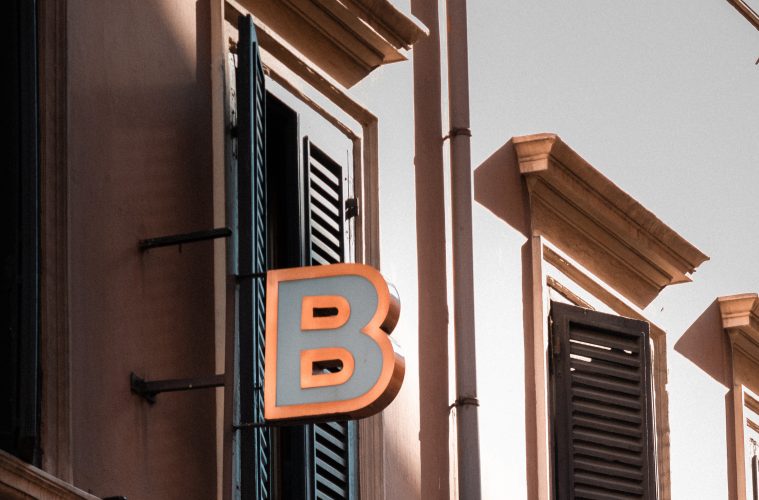
NABJ to Query Members on Capitalizing ‘Black’
The National Association of Black Journalists plans to seek members’ opinions on capitalizing “Black” when referring to black people, its executive director said Thursday after a report that NABJ had already made such a decision.
The Boston Globe has become one of the latest mainstream news organizations to capitalize the word, while the investigative publication Mother Jones is inviting opinions from interested parties, including “Journal-isms” readers.
“As you know, there are multiple opinions for and against the capitalization of ‘black,’ NABJ Executive Director Drew Berry told Journal-isms by email. “Although the previous administration appealed to the Associated Press to capitalize ‘Black,’ the official permanent NABJ position is undetermined.
“President Dorothy Tucker is in the process of conducting an official quantitative and qualitative survey of our members to determine preferences. Although NABJ members and staff generally use a capital ‘B’ in many instances, the organization will issue its official style guide usage on this and a few more issues in its updated style guide.”
In a piece attributed to its copy desk, BuzzFeed wrote Saturday, “Most US media outlets follow AP style — lowercasing black across the board as an adjective referring to people of African descent.
“We follow that for news stories, but if an essayist or op-ed writer uses Black, we let the capitalization stand. It’s a policy that allows us to follow what’s generally accepted, but also respect personal narratives.
“We reached out to editors and copy editors from publications who’ve fallen on both sides of the style ruling. Because some mentioned the style guidelines of the National Association of Black Journalists, which notably had not capitalized black, we contacted the NABJ’s director of communications, Kanya Stewart. She told us the association had decided to revise its style and shared the following statement:
“The National Association of Black Journalists (NABJ) has adopted capitalizing the letter ‘b’ in the word ‘Black’ when it is used as a proper adjective, describing a diaspora, community, group and the like — just as Caucasian, Asian, Hispanic, etc. are capitalized.
“Capitalizing the word properly recognizes the identity of Black people.
“We are in the process of updating our online style guide and have already begun capitalizing Black in our communications and publications. We have also requested that the Associated Press consider making this change in the AP Stylebook.”
While many black publications capitalize the “B” in “black,” journalists who work for white-owned media have traditionally comprised the majority of NABJ members.
However, Boston Globe Editor Brian McGrory wrote his staff, “Effective immediately, we’re updating the Globe stylebook to put the word Black in uppercase when it is used to describe a person’s race,” Dan Kennedy, an associate professor at Northeastern University’s School of Journalism, reported Jan. 30 on his Boston-based media website.
” ‘After consulting with leaders in the Black community, we’re making this change to recognize that the word has evolved from a description of a person’s skin color to signify a race and culture, and as such, deserves uppercase treatment in the same way that other races — Latino being one example — are capitalized. Unless otherwise requested by a person we’re writing about, we’ll use Black, which is considered to be more inclusive, rather than African-American.’ “
The San Francisco-based Mother Jones announced Feb. 10 that it was publishing its internal style guide for the first time in its 44-year history.
“A work in progress, of course!” copy editor Daniel King messaged Journal-isms. “Excited to get reader feedback, which is coming in constructively, and keep improving it as a living document.”
Among the questions King posed to readers:
“When should we use Latinx? Check our entry; see if you agree.
“Should Black and Brown always be capitalized (but not white) in all references to race or should Mother Jones defer to individual writers’ and sources’ discretion (as we do now) to affirm personal choice even at the cost of consistency?
“What’s the distinction between ‘white supremacy’ and ‘white nationalism’? See our entry.
Mother Jones’ entry on “race” takes on “Asian, Asian American,” “blacks/Blacks, whites,” “community vs. communities,” and “dual heritage, compound nationalities/ethnicities.”
It also weighs in on “Hispanic,” “multiracial,” “people of color,” “voters” and “white supremacy, white nationalism.”
On capitalization of “Black,” the entry says:
“Whether black/Black and brown/Brown are always capitalized is up to writers’ and sources’ discretion, but it’s an active conversation in search of consistency. Some publications lowercase (e.g., The Root) and some capitalize (e.g., Seattle Times). Let us know what you think at styleguide@motherjones.com,” or in a space provided on the Mother Jones website. Journal-isms readers may comment via https://www.journal-isms.com/contact/
. . . Readers Have as Many Questions as Answers
Should there be a capital “B” in “Black”? Daniel King (pictured), Mother Jones copy editor, tells Journal-isms, “It’s a great question that gets at the heart of a rapidly evolving and fiercely debated conversation among so many readers whose views we’re inviting and eager to hear, and who tell us they have as many questions as answers:
 “Why capitalize one or two but not all? Why not lowercase all?,” King said by email Wednesday. “And why not defer to individual sources’ and writers’ discretion even at the cost of consistency? The latter is where Mother Jones is right now, honoring individuals’ choices.
“Why capitalize one or two but not all? Why not lowercase all?,” King said by email Wednesday. “And why not defer to individual sources’ and writers’ discretion even at the cost of consistency? The latter is where Mother Jones is right now, honoring individuals’ choices.
[King delivered an update on Thursday: ” We’re starting to default to capitalization of both Black and Brown in general references following the wishes of several staff members of color, expressed in the newsroom today, and we’ll also respect individuals’ wishes if they prefer otherwise in first-person context since there’s varying views. But default is now capitalization. We’ll update the style guide to reflect that today, and always want reader feedback. “]
“But it’s hardly static: Instead of declaring, we’re listening, to The Root, the National Association of Black Journalists, and many other publications and organizations. NABJ just announced it’s capitalizing Black, while The Root announced it affirms lowercase. And brown/Brown is a related question. Among the reasons readers tell us:
- “What matters is who’s in the room and who’s not. What’s important is that the decision either way is effectively made by people who are themselves Black/black or Brown/brown or publications historically run by and created for communities of people who are. Whatever the stance, that’s what counts most.
- “Why capitalize some groups like Native and Indigenous but not Black and Brown? Capitalize all —but not white because capitalizing ‘W’ is the practice and strategy of white supremacists, and that alone is reason not to. Consistency and parallelism are much less valuable than not propping up the style symbols of white supremacists. And white is not parallel to Black and Brown in the world by any reading of history, power, and group constructs.
- “W.E.B. Du Bois’ letter-writing campaign in the mid-1920s petitioned newsrooms and book publishers to capitalize the ‘n’ in Negro, and the historical parallel is instructive: He eventually got the very white and racist New York Times at the time — and Encyclopedia Britannica — to agree. The Times announced in March 1930: ‘It is not merely a typographical change, it is an act in recognition of racial respect for those who have been generations in the “lower case.” ‘
- “Capitalize Black but not brown because brown doesn’t refer to a distinct group in the same sense Black does, goes one argument. The skin-color references aren’t the point; the groups’ identities and experiences and treatments are.
- “Lowercase black, brown, and white as defaults for consistency, unless sources or writers prefer otherwise.
- “The distinction between ‘proper nouns’ and ‘common nouns’ is a flawed one that reinforces rigid and racist origins of style, so drop the descriptivism vs. prescriptivism debate and just honor what readers say they want.
- ” Lowercase black, brown, and white because, in the words of one reader who has a black parent and a white parent, ‘That’s genuine equality. I understand the argument for capitalizing black, but genuine equality is best reflected and reinforced by a style that treats the words and people equally. In my opinion.’ ”
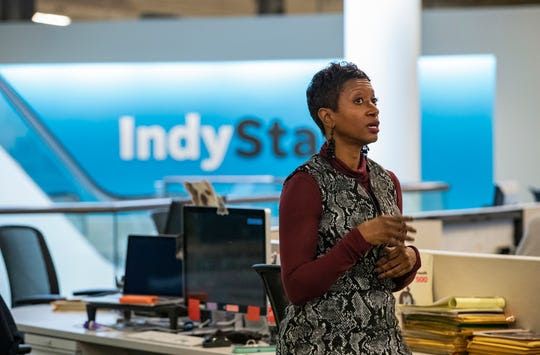
Katrice Hardy Named Editor of Indy Star
“The award-winning executive editor of South Carolina’s Greenville News will become the first African American and the first woman to serve as executive editor of The Indianapolis Star, parent company Gannett announced Wednesday,” Shari Rudavsky reported for the Star.
“Katrice Hardy, who joined Gannett in 2016, also has served as the USA TODAY Network’s regional editor for the South, overseeing newsrooms in Arkansas, Mississippi, Alabama, North Carolina and her native Louisiana. She came to Greenville after more than two decades at the Virginian-Pilot in Norfolk, where she held a variety of positions before becoming managing editor.
“In her new role in Indianapolis, she will oversee more than two dozen Gannett newsrooms throughout Indiana, Illinois and Kentucky as the Midwest regional editor.
“At a meeting Wednesday afternoon where Hardy was introduced to the IndyStar newsroom, she said she would encourage the paper to be ‘big, bold, ambitious and innovative.’ . . .”
Rudovsky also wrote, “The choice of an African American woman to lead Indiana’s largest newsroom is nothing short of ‘huge,’ said Steve Jefferson, president of the Indianapolis Association of Black Journalists.
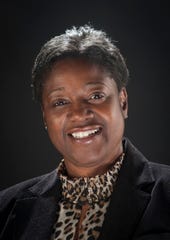 “ ‘It changes the face of who is usually in charge when it comes to editorial decisions in our community,’ he said. ‘It also has the potential to make sure that there is more coverage considered when it comes to the African American community, and I think it also lends to having someone in the position that can also help with gender sensitive coverage as well.’ . . .”
“ ‘It changes the face of who is usually in charge when it comes to editorial decisions in our community,’ he said. ‘It also has the potential to make sure that there is more coverage considered when it comes to the African American community, and I think it also lends to having someone in the position that can also help with gender sensitive coverage as well.’ . . .”
In January, Hardy, in her role as Gannett’s regional editor for the South, announced the appointment of Mary Irby-Jones (pictured) as top editor of two Mississippi newspapers, the Clarion Ledger in Jackson and the Hattiesburg American.
The Clarion Ledger reported Jan. 16, “Irby-Jones has most recently worked as the Digital Director for the Clarion Ledger where she oversaw a regional digital operation for the eight newsrooms in the Deep South.
“She returned to Gannett in May after 12 years of working in a converged newsroom for Cox Media Ohio in Dayton, Ohio, where she oversaw a 24/7 digital team for three Ohio newspapers and WHIO-TV and Radio. Other roles she performed at Cox include Senior Editor of the Dayton Daily News and Managing Editor for WHIO-TV. . . .”
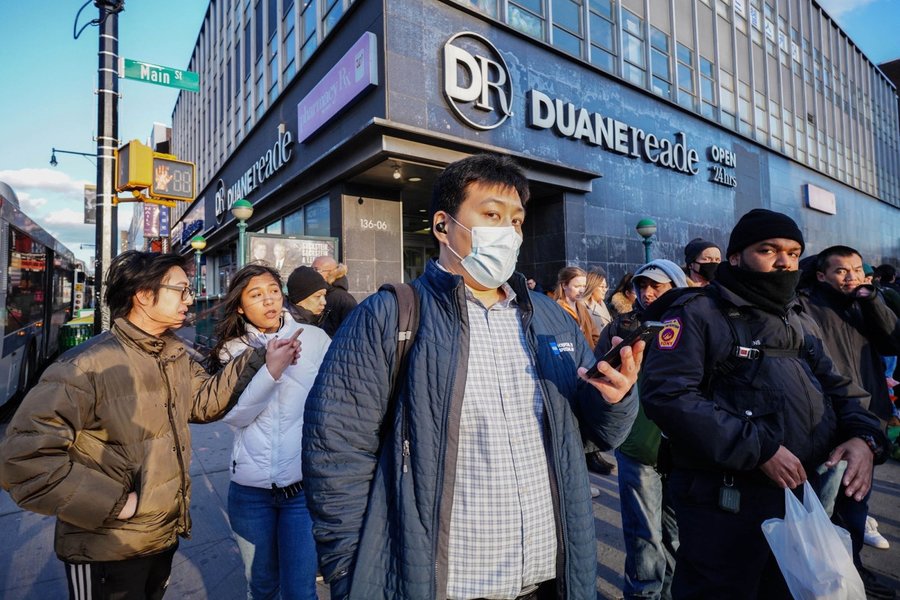
First case of coronavirus confirmed in Manhattan https://t.co/DHZ5uROtAa pic.twitter.com/6NfATbDFT6
— New York Post (@
Asian Americans See Ties to Coronavirus as Racist
“The New York Post is being criticized by hundreds of people on Twitter for a photo it ran with a story about New York’s first case of COVID-19,” Louis Chan wrote Monday for AsAmNews.
“The headline ‘First case of coronavirus confirmed in New York City’ focused on a woman who recently returned from Iran. The original photo that ran with the story showed an Asian man in [Flushing, Queens] with a mask over his face.
“ ‘Editors chose a picture of Asians in Flushing Qns to report a confirmed case in Manhattan involving a person who returned from Iran. Just the facts ma’am. Stop the xenophobia.’ Karlin Chan, an activist in New York tweeted.
“The tweet has been liked some 250 times.
“The photo has since been taken down and replaced by a video from a news conference. . . .”
On Feb. 13, the Asian American Journalists Association “called on news outlets reporting on the coronavirus outbreak to be accurate and mindful about their coverage,” Julian Shen-Berro reported for NBC News.
“In a statement, the group said growing concerns over the virus have been accompanied by increased hostility and discrimination toward Asians and Asian Americans. The posting cautions against ‘fueling xenophobia and racism that have already emerged since the outbreak.’ . . .”
. . . NABJ Not Expecting Virus to Stop Convention
Unless a government order says otherwise or the hotel shuts down independently, there is little chance the planned joint convention of the National Association of Black Journalists and National Association of Hispanic Journalists will be canceled because of the coronavirus, NABJ Executive Director Drew Berry (pictured) told Journal-isms on Thursday.
 Berry said the July 8-12 convention, scheduled for Washington, could attract up to 6,000 people. Last year’s NABJ convention in Miami attracted about 4,100; NAHJ had more than 600 in San Antonio. The Asian American Journalists Association also plans to be in Washington, from July 29 to Aug. 1, while the Native American Journalists Association is scheduled for Phoenix Sept. 13-16.
Berry said the July 8-12 convention, scheduled for Washington, could attract up to 6,000 people. Last year’s NABJ convention in Miami attracted about 4,100; NAHJ had more than 600 in San Antonio. The Asian American Journalists Association also plans to be in Washington, from July 29 to Aug. 1, while the Native American Journalists Association is scheduled for Phoenix Sept. 13-16.
Asked whether NABJ is covered by insurance against the eventuality of such a cancellation, Berry replied by email:
“The insurance industry is not issuing new insurance policies to cover the virus because the coronavirus is considered a ‘pre-existing condition.’ That’s the language they are all using since the outbreak. You would have had to purchase it BEFORE the outbreak in China. (Go figure.) Even [Lloyds] of London is steering clear of this. As you know, it sets the standard for ‘high risk’ policies like the one we had last year in Miami for possible
hurricanes and other force majeure events.
“Any other new pandemic or epidemic or ‘force majeure’ event is covered under our newest policy but like most other organizations the loophole of ‘pre-existing condition’ leaves us coverage for everything but Coronavirus. That said, there is still a loophole that could be used for [worst] case scenarios. For example, if local, state or federal government says shutdown the hotel or conference, or the hotel shuts down for PR or any other reason, our hotel cancellation policy kicks in and we are off the hook for expenditures. We have enough funds to ‘weather the storm.’ We have now built into our budget automatic coverage year around for just about everything going forward, no matter when…or if… something new pops up.
“Also, the good news is that we are still trending toward another record attendance when compared to this time in previous years and all partner companies are still going full-steam ahead with financial and other commitments to this year’s convention. There are absolutely NO reductions in sending staff or convention engagements.”
- David Bauder, Associated Press: Media Faces Challenges In Covering Coronavirus
- Andrew J. Campa, Anh Do and Colleen Shalby, Los Angeles Times: Officials decry anti-Asian bigotry, misinformation amid coronavirus outbreak
- Leah Carroll, refinery 29.com: Why Does Every Coronavirus Story Show An Image Of Chinatown? Racism.
- David Choi, Business Insider: ‘They are a very hungry people’: Fox News host fuels racist tropes about Chinese over coronavirus outbreak
- Amy-Xiaoshi DePaola, AsAmNews: Politicians and News Media Fuel Hysteria and Xenophobia over Coronavirus, According to Report
- Amna Nawaz, Lorna Baldwin, Mike Fritz and Casey Kuhn, “PBS News Hour”: How San Francisco is fighting novel coronavirus — and the stigma that comes with it
- Nydia Han, Philadelphia Inquirer: Philly TV anchor: Being Asian doesn’t mean I have coronavirus
- Clarence Page, Chicago Tribune: Trump’s chickens come home to roost in coronavirus confusion
- Al Tompkins, Poynter Institute: How newsrooms can tone down their coronavirus coverage while still reporting responsibly
More to come
Support Journal-isms
Facebook users: “Like” “Richard Prince’s Journal-isms” on Facebook.
Follow Richard Prince on Twitter @princeeditor
Richard Prince’s Journal-isms originates from Washington. It began in print before most of us knew what the internet was, and it would like to be referred to as a “column.” Any views expressed in the column are those of the person or organization quoted and not those of any other entity. Send tips, comments and concerns to Richard Prince at journal-isms-owner@yahoogroups.com
View previous columns (after Feb. 13, 2016).
- Diversity’s Greatest Hits, 2018 (Jan. 4, 2019)
- Book Notes: Is Taking a Knee Really All That? (Dec. 20, 2018)
- Book Notes: Challenging ’45’ and Proudly Telling the Story (Dec. 18, 2018)
- Book Notes: Get Down With the Legends! (Dec. 11, 2018)
- Journalist Richard Prince w/Joe Madison (Sirius XM, April 18, 2018) (podcast)
- Richard Prince (journalist) (Wikipedia entry)
- February 2018 Podcast: Richard “Dick” Prince on the need for newsroom diversity (Gabriel Greschler, Student Press Law Center, Feb. 26, 2018)
- Diversity’s Greatest Hits, 2017 — Where Will They Take Us in the Year Ahead?
- Book Notes: Best Sellers, Uncovered Treasures, Overlooked History (Dec. 19, 2017)
- An advocate for diversity in the media is still pressing for representation, (Courtland Milloy, Washington Post, Nov. 28, 2017)
- Morgan Global Journalism Review: Journal-isms Journeys On (Aug. 31, 2017)
- Diversity’s Greatest Hits, 2016
- Book Notes: 16 Writers Dish About ‘Chelle,’ the First Lady
- Book Notes: From Coretta to Barack, and in Search of the Godfather
- Journal-isms’ Richard Prince Wants Your Ideas (FishbowlDC, Feb. 26, 2016)
- “JOURNAL-ISMS” IS LATEST TO BEAR BRUNT OF INDUSTRY’S ECONOMIC WOES (Feb. 19, 2016)
- Richard Prince with Charlayne Hunter-Gault,“PBS NewsHour,” “What stagnant diversity means for America’s newsrooms” (Dec. 15, 2015)
- Book Notes: Journalists Follow Their Passions
- Book Notes: Journalists Who Rocked Their World
- Book Notes: Hands Up! Read This!
- Book Notes: New Cosby Bio Looks Like a Best-Seller
- Journo-diversity advocate turns attention to Ezra Klein project (Erik Wemple, Washington Post, March 5, 2014)
